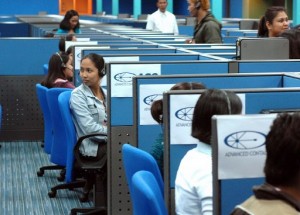Palace lukewarm to DICT bill, says legislator

Filipino call center agents attend to US clients at a business process outsourcing office in Manila in this file photo. The BPO sector, which relies heavily on ICT services for operations, stands to benefit from the DICT bill, if enacted into law. The Aquino administration, however, is still allegedly still hesitant to create a separate ICT department due to budgetary and manpower issues, according to a proponent, Representative Sigfrido Tinga. AFP PHOTO/ROMEO GACAD
The main proponent for the measure to establish a Department of Information and Communications Technology (DICT) has urged administration officials to throw their support behind the bill that has the potential to attract more investments into the country.
Representative Sigfrido Tinga said the creation of a DICT would send a message to prospective investors that the Philippines was serious in supporting its technology sector that includes manufacturing and services, particularly, business process outsourcing (BPO).
“Unfortunately, the DICT is just not a priority for the executive. I think they still need to be convinced that this is important,” Tinga said earlier this week.
House Bill 4667, the measure that aims to create the DICT, was passed by the House late last year. The Senate, meanwhile, passed on the third and final reading a counterpart measure, Senate Bill 50, last February.
The two bills were scheduled to be consolidated in a bicameral session earlier this year.
Article continues after this advertisementTinga revealed that the bicameral conference, which would have resulted in a consolidated measure being transmitted to Malacañang for President Aquino’s approval, was postponed indefinitely at the Palace’s request.
Article continues after this advertisement“Right now, there’s a directive from the executive to hold off on the bicam until all issues are addressed,” said Tinga, a member of the ruling Liberal Party. “They still look at the DICT as an unnecessary bureaucracy. But of course, for us in the industry, we are biased and our stand is that this will be good for the country,” the lawmaker said.
“Technology will be the country’s main industry in the future,” he said.
Tinga said he understood the Palace’s concerns, admitting that the new department would lead to “budgetary” and manpower issues for the administration that is trying hard to keep costs down.
But he said the gains of having a department whose sole duty is to oversee and help develop the country’s technology sector would outweigh the costs.
One of the main beneficiaries of the law is the country’s booming BPO sector, which relies heavily on ICT services for operations.
In a position paper submitted to the Senate, the Federation of Filipino-Chinese Chambers of Commerce and Industry Inc. underscored that the new department will help ensure the country’s global competitiveness and attractiveness for foreign investments, particularly during the digital age.
Under the bill, agencies such as the ICT Office currently under the Department of Science and Technology, the National Computer Center and the Telecommunications Office will be absorbed by the DICT.
The National Telecommunications Commission and the Philippine Postal Corp., meanwhile, will be attached agencies.